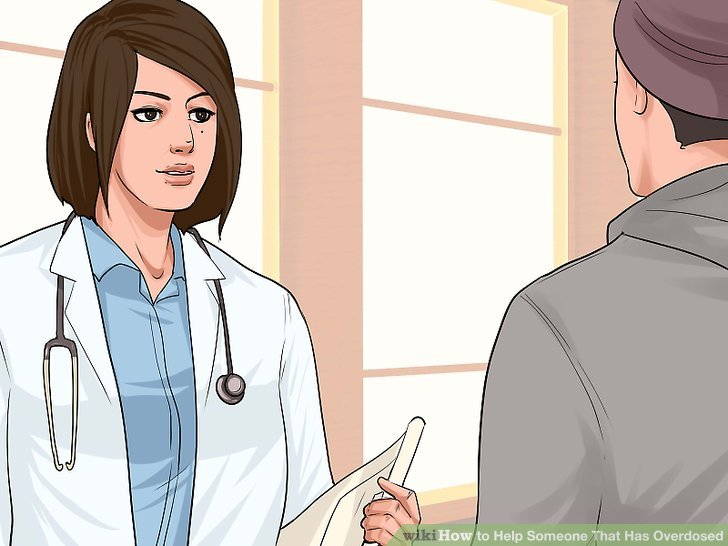Back First Aid Explained
How to Help Someone That Has Overdosed
We have selected the following expert medical opinion based on its clarity, reliability and accuracy. Credits: Sourced from the website wikiHow. Please refer to your own medical practitioner for a final perspective, assessment or evaluation.
Overview
Overdosing is when someone ingests or applies a substance, such as drugs, beyond the recommended dosage. Drug overdose has been the leading cause of injury deaths in the United States. It can also happen when mixing substances; it can put a huge strain on your body and increase the risk factor. If you witness someone overdosing or suspect someone of overdosing, follow these steps below.
Steps
1. Call for an AMBULANCE right away (see "EMERGENCY NUMBERS" above)
Do not wait for the drug to wear off; call for help right away. A drug overdose can be fatal or cause permanent damage to a person's organs.
2. Look for symptoms
There are many symptoms of drug overdose, which include:
- Change in body temperature (sweating or overheating; shivering or drop in body temperature)
- Heart rate changing drastically
- Chest pains
- Vomiting
- Diarrhea
- Difficulty breathing
- Abdominal cramps
- Dizziness
- Seizures
- Snoring deeply
- Skin turning pale
3. Stay close to them, and always keep an eye on them
Someone who has overdosed can go in and out of consciousness. Try to keep the patient awake.
4. Make sure they do not eat or drink
If you do not know what they have taken, or even if you do, it may not be safe to put other chemicals in the body, as this can have a negative or even dangerous reaction.
5. Know what to do if the person is having a seizure
In some cases, an overdose can cause a person to have a seizure, which can be doubly scary if you've never dealt with either situation before. However, the steps for dealing with someone's seizure are actually fairly simple in nature.
- Lower the person to the floor.
- Make sure the person is still breathing.
- Stay with the person. Especially since this person has just overdosed, do not leave them alone.
6. Do not give them a "shower"
A common suggestion for those who have overdosed on drugs or are suffering from alcohol poisoning is to get the person into a shower and turn on the cold water, dousing them. Avoid doing this in any situation. The water temperature might put the body in shock and cause the person's body temperature to drop into dangerous levels - and it's pretty tough to drag a person in and out of a shower if they're incapacitated.
7. Get information on what substance the person might have taken
If the person is conscious and able to communicate, try to get information on what they overdosed on. This will help the doctors or paramedics to give the appropriate treatment without wasting any time.
8. Get medical help
After the overdose, the person who overdosed should get immediate medical attention. This will help others to understand if the overdose was intentional or accidental, which, in turn, helps the person and medical figures figure out if they need psychiatric help.
9. Always check up on the individual
Get them the proper help. Give them the right contacts such as a rehab or addiction hotline (Call SADAG on 0800 567 567).
_______________________________________________________________________________________________________________________
Are you a healthcare practitioner who enjoys patient education, interaction and communication?
If so, we invite you to criticise, contribute to or help improve our content. We find that many practicing doctors who regularly communicate with patients develop novel and often highly effective ways to convey complex medical information in a simplified, accurate and compassionate manner.
MedSquirrel is a shared knowledge, collective intelligence digital platform developed to share medical expertise between doctors and patients. We support collaboration, as opposed to competition, between all members of the healthcare profession and are striving towards the provision of peer reviewed, accurate and simplified medical information to patients. Please share your unique communication style, experience and insights with a wider audience of patients, as well as your colleagues, by contributing to our digital platform.
Your contribution will be credited to you and your name, practice and field of interest will be made visible to the world. (Contact us via the orange feed-back button on the right).
Disclaimer:
MedSquirrel is a shared knowledge, collective intelligence digital platform developed to share medical knowledge between doctors and patients. If you are a healthcare practitioner, we invite you to criticise, contribute or help improve our content. We support collaboration among all members of the healthcare profession since we strive for the provision of world-class, peer-reviewed, accurate and transparent medical information.
MedSquirrel should not be used for diagnosis, treatment or prescription. Always refer any questions about diagnosis, treatment or prescription to your Doctor.






